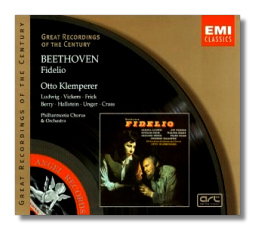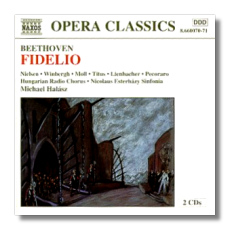
The Internet's Premier Classical Music Source
Related Links
- Beethoven Reviews
- Latest Reviews
- More Reviews
-
By Composer
-
Collections
DVD & Blu-ray
Books
Concert Reviews
Articles/Interviews
Software
Audio
Search Amazon
Recommended Links
Site News
 CD Review
CD Review
Ludwig van Beethoven

Fidelio (1803-14)
- Christa Ludwig (Lenore)
- Jon Vickers (Florestan)
- Walter Berry (Don Pizarro)
- Gottlob Frick (Rocco)
- Igneborg Hallstein (Marzelline)
- Gerhard Unger (Jaquino)
- Franz Crass (Don Fernando)
Philharmonia Orchestra & Chorus/Otto Klemperer
EMI 67361


- Inga Nielsen (Lenore)
- Gosta Winbergh (Florestan)
- Alan Titus (Don Pizarro)
- Kurt Moll (Rocco)
- Edith Lienbacher (Marzelline)
- Herwig Pecoraro (Jaquino)
- Wolfgang Glashof (Don Farnando)
Hungarian Radio Chorus
Nicolaus Esterházy Sinfonia/Michael Halász
Naxos 8.660070
I will confess at the outset that opera is far from being my forte. I do love a few pieces such as Wozzeck, Carmen and Dialogues des Carmelites. I can't stand most operas, such as Traviata, because the story line is so insipid that it makes standard television fare seem sophisticated. I will now duck my head into the intellectual bunker and await incoming. Anyway, I will also confess that I find the plot of Fidelio not unlike a bad 60s naïve liberalist paean to the strength of the individual over the establishment. In some respects it is just downright silly.
Still, it is Beethoven and there are moments that can be appreciated. The Missa comes to mind at times and at others the Choral Symphony. Listening to two different (actually three) recordings has been a mind tease. The bottom line is if the performance/recording can transcend the inherent limitations on the story line and make the experience worthwhile. I can report, to those who have not already skipped to the last line, that these two recordings would be important additions to your classical conceptions of Fidelio and both transcend the plot.
Let me offer the following as a way to think about the differences between the two sets, it has to do with phrasing. I recently re-took-up the guitar. Back in the late sixties I taught myself how to play the guitar and sang a lot of folk songs, especially Bob Dylan. Anyway, I have been relearning "The Times They Are A'Changin". I listened to Dylans' Guthrie version from 1960 and then his 90s version. The difference is not just in timings, it is in phrasings even more so. In the 60s Dylan sounded angry and spat the words out. Thirty years later he has slowed down and the singing has an almost bluesy tinge to it. This thought came to mind as I listened to Rocco's contributions on EMI and then Moll on Naxos. Frick "sounds" more conspiratorial than Moll. That is important because Rocco ought to sound more conspiratorial. While Moll is doing a fine job, he lacks that aspect of phrasing that Frick brings to the opera.
Now, this review is also a learning experience for me in many other ways. I have had the Klemperer recording in my collection for some time in its previous CD incarnation (the third recording referred to above, EMI 69320) but never warmed to it. In fact, when I first got the Naxos recording and listened to the two, the Naxos sounded much better. The new mastering of the EMI recording, however, has transformed the whole experience. The bass is much deeper and richer, the timpani have been brought forth from the orchestral fabric, and the whole thing now has a presence, a pulse that it lacked before. It amazes me how different the whole experience is as a result of remasterings that work. Now, by comparison, the Naxos recording sounds less involving than it did.
Still, you really ought to listen to both recordings for educational purposes.
Klemperer's identification with Fidelio stretches back to the early days of his music making. (The notes offer a fascinating story of the conductor's life with the music.) What we have on this GROC release is a powerful, committed performance that now can be heard in full glory. Marzelline, as captured by Hallstein captivates me, Ludwig and Vickers cannot be bettered. I feel that everyone at the Klemperer recording had a sense of event at this recording and now you can hear it in full glory.
If anything, this is a case where the great is the enemy of the good. If the Halász release is less than Klemperer it still offers a lot to enjoy. The music is faster paced, the strings lighter, no doubt due to less of them, and the singing is very good. If you are not familiar with the piece and want a budget recording, this would be an excellent place to start. If you already have the EMI recording you will find the contrast with Naxos to be enlightening. Learning is always good. This is why we need more than one recording of a piece of music before we can lay any claim to appreciating it.
As a lagniappe, EMI has thrown in Klemperer's recording of Lenore #3. He frequently appended it to the opening of the opera's final scene. The notes discuss this and if you are so inclined you can program your player to insert it to listen to the effect. It was Mahler who first suggested it and I found that the idea works (at least after several listenings) quite well.
For what it is worth, the Naxos set has one of the worst typos I have ever come across. It lists Beethoven's dates of existence as: 1714-1787. Does anyone have any idea to whom those dates actually belong? [Christoph Willibald Ritter von Gluck (1714-1787) - Ed.]
Okay, final paragraph, especially for those who skip to it at the first. I have listened to this EMI release several times over the past few days. The more I listen to it the more I like the opera. It is no doubt a case where not knowing the words helps me appreciate the music more. No matter how hard I try, I cannot overcome the feeling that the characters here are all one-dimensional and that is due to Beethoven's work. The fact that Klemperer and crew elevate the music to this level of art is a testament to the conductor's dedication and the fact that the cast must have also felt the passion Klemperer did. This EMI release is truly a great recording of the century and should be in the collection of any serious listener to classical music.
Okay, a final, final paragraph. As it happens the New York Times recently did a review of Fidelio. The writer, Bernard Holland, offers some comments that best express my feelings about the opera. I share them with you. "Besotted by the American and French Revolutions, Beethoven made 'Fidelio' a manifesto in itself, giving his opera an earnestness and passion that almost smothers it in good will. Here is great music driven by heartfelt sentiment, struggling to occupy an operatic stage." So it goes.
Copyright © 2001, Robert Stumpf II


















